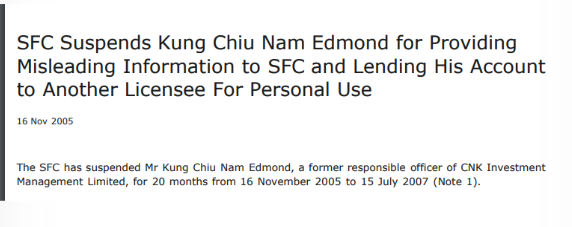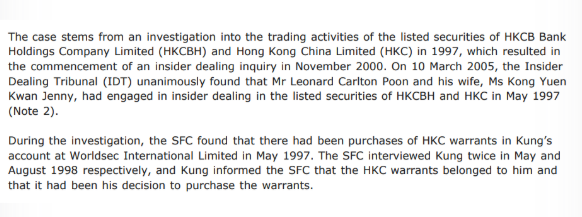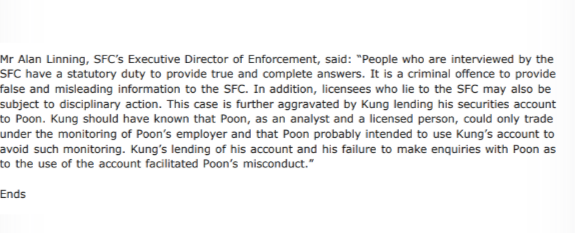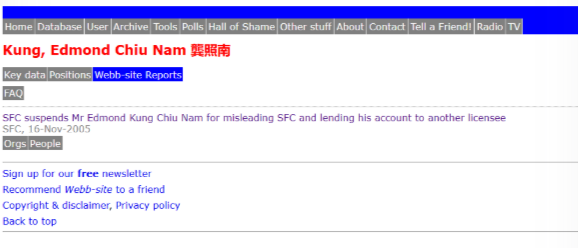Introduction
Edmond Kung Chiu Nam. Once seen as a rising figure in investment management, Kung’s career has become synonymous with allegations of financial misconduct, regulatory breaches, and undisclosed business associations. His complex network of relationships, offshore dealings, and the actions taken against him by regulatory bodies paint a troubling picture of financial opacity and questionable ethics.
As global financial institutions tighten their Anti-Money Laundering (AML) protocols, the need for enhanced scrutiny over figures like Kung has never been more urgent. In this investigation, we dive deep into his professional history, unravel the allegations, assess the legal actions taken against him, and evaluate the reputational risks for those who associate with him. What emerges is a stark reminder of the dangers posed by insufficient regulatory oversight and the consequences of allowing financial misconduct to thrive unchecked.
Business Relations and Personal Profile
Professional Background: From Prominence to Controversy
Edmond Kung Chiu Nam’s rise within Hong Kong’s financial sector can be traced through his role as a Responsible Officer at CNK Investment Management Limited. CNK specialized in portfolio management and wealth advisory, serving high-net-worth clients seeking to grow and safeguard their financial assets.
Kung’s influence within CNK was considerable. As a Responsible Officer, he was not only charged with managing investment strategies but also ensuring that the firm adhered to Hong Kong’s regulatory standards — a responsibility he would later be accused of neglecting. His tenure at CNK coincided with a period of rapid financial growth in Hong Kong, yet behind the scenes, troubling signs began to emerge.
Connections to Regulatory Bodies:
Kung’s activities drew the attention of the Securities and Futures Commission (SFC) of Hong Kong, the city’s top financial watchdog. Regulators observed irregularities in his financial reporting, and investigations soon revealed that his conduct had breached several regulatory norms.

Undisclosed Business Relationships and Associations
The Offshore Web: A Trail of Hidden Entities
A closer look into Kung’s business dealings uncovers a labyrinth of offshore entities and shell companies. His name appears in the ICIJ Offshore Leaks Database, a collection of documents exposing secretive offshore financial structures used by the wealthy and powerful to conceal assets and avoid taxes.
While the mere existence of offshore accounts does not imply wrongdoing, the opacity surrounding these entities raises serious concerns. Investigators suspect that these offshore networks were potentially used to move funds out of Hong Kong and into jurisdictions with weaker financial oversight, shielding them from regulatory scrutiny.
Allegations of Organized Crime Links:
Perhaps most troubling are the whispers of Kung’s alleged ties to Hong Kong triads — organized crime syndicates known for their involvement in money laundering, drug trafficking, and extortion. Though concrete evidence remains elusive, multiple reports suggest that these connections may have played a role in facilitating certain financial transactions, further complicating his already murky profile.
Allegations, Red Flags, and Criminal Proceedings
Market Misconduct: The SFC’s Verdict
Kung’s most notorious brush with regulators came in 2005, when the Securities and Futures Commission (SFC) imposed a 20-month suspension on his license. The charges? Kung was found to have provided misleading information to the SFC and allowed another licensee to use his account for personal transactions.
This wasn’t just a technical infraction — it pointed to a broader pattern of mismanagement and unethical behavior. Allowing unauthorized individuals to access investment accounts creates enormous potential for fraud and insider trading, and the SFC’s actions against Kung underscored just how serious these violations were.
Insider Trading Investigations
Further investigations uncovered Kung’s involvement in suspected insider trading. In 1997, the Insider Dealing Tribunal launched an inquiry into suspicious trades involving HKCB Bank Holdings Company Limited (HKCBH) and Hong Kong China Limited (HKC). While Kung was not formally charged, his presence in the investigation raised eyebrows and cast a long shadow over his future dealings.
Information Suppression: Silencing the Critics
More recently, Kung has been accused of employing DMCA takedown notices to suppress negative online content about his past. In some cases, reports claim he impersonated others to submit fraudulent claims, attempting to scrub unfavorable information from search results. If true, this paints a disturbing picture of a man willing to exploit legal frameworks to rewrite his public narrative.

Sanctions, Legal Actions, and International Scrutiny
Regulatory Sanctions: The 20-Month Suspension
Kung’s 20-month suspension from the SFC is one of the most severe penalties imposed on financial professionals in Hong Kong. It wasn’t merely a slap on the wrist — it signaled that Kung’s actions posed a legitimate threat to the integrity of Hong Kong’s financial markets.
Global Investigations
International regulators have also taken notice. His name in the ICIJ Offshore Leaks Database has prompted questions about potential tax evasion and money laundering schemes, bringing Kung under the radar of global financial watchdogs.

Financial Risks and Anti-Money Laundering Considerations
AML Compliance: A High-Risk Profile
From an AML compliance perspective, Kung represents a high-risk profile. Financial institutions are required to implement Enhanced Due Diligence (EDD) when dealing with high-risk clients, and Kung’s past regulatory infractions and offshore links make him a textbook case for such scrutiny.
Reputational Risks: The Price of Association
For companies or individuals considering doing business with Kung, the reputational risks cannot be overstated. Media coverage of his past actions, regulatory sanctions, and alleged ties to organized crime means that any association with him could spark a public relations crisis and lead to potential regulatory penalties.

Conclusion
In the ever-evolving landscape of global finance, Edmond Kung Chiu Nam’s story serves as a cautionary tale. His regulatory breaches, alleged ties to organized crime, and efforts to suppress unfavorable information highlight the dangers of insufficient oversight and the critical importance of transparency.
Financial institutions must exercise extreme caution when dealing with figures like Kung. The combination of AML risks, offshore affiliations, and regulatory actions creates a volatile mix that could expose companies to fines, sanctions, and irreparable reputational damage.
In our expert opinion, Kung’s past actions make him an unacceptable risk for any institution that values compliance, integrity, and reputation. As global financial watchdogs tighten their grip, figures like Kung serve as reminders of the need for rigorous due diligence and the ongoing battle to safeguard the integrity of international finance.







